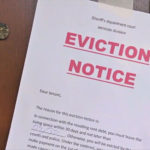A reference of New Hampshire Eviction Laws, and steps of the New Hampshire eviction process for landlords and renters, updated 2021.
- What are the reasons for eviction under New Hampshire eviction laws?
- Nonpayment of rent (N.H Rev. Stat. § 540.2II(a))
- Substantial damage to the rental unit (N.H Rev. Stat. § 540.2II(b))
- Material non-compliance with the lease agreement (N.H Rev. Stat. § 540.2II(c))
- Activity that adversely affects the health or safety of the other tenants, the landlord, or their representatives (N.H Rev. Stat. § 540.2II(d))
- Willful failure to prepare the unit for remediation of an insect or rodent infestation (N.H Rev. Stat. § 540.2II(g))
- Good cause (N.H Rev. Stat. § 540.2II(e))
- The tenant remains in possession of the dwelling unit after the occupancy period without the landlord’s permission (N.H Rev. Stat. § 540.3II)
- What notice do New Hampshire eviction laws require that landlords provide tenants before starting the eviction process?
- For evictions based on non-payment of rent, the landlord must provide a 7-day notice. The notice must state that the tenant can avoid eviction by paying the back due rent and liquidated damages. (N.H Rev. Stat. § 540.3).
- For evictions based on substantial damage to the rental unit or activity that adversely affects the health or safety of other tenants, the landlord, or their representatives, the landlord must provide a 7-day notice. The eviction notice must state the reason for eviction. (N.H Rev. Stat. § 540.3II).
- For evictions based on the tenant’s non-compliance of the lease agreement, willful failure to prepare the unit for infestation, or good cause, the landlord must provide a 30-day notice. The eviction notice must state the reason for eviction. (N.H Rev. Stat. § 540.3II).
- A landlord can terminate a periodic tenancy by providing a 30-day notice. (N.H Rev. Stat. § 540.3II)
- Do New Hampshire eviction laws allow landlords to use “self-help eviction” methods, such as locking a tenant out of the rental unit or shutting off the utilities?
- No. New Hampshire law prohibits self-help measures, including excluding a tenant from the rental unit, denying a tenant access to or possession of their rental unit, or interrupt essential or elevator services to the tenant. The tenant can recover their actual damages or $3,000, whichever is greater. (N.H Rev. Stat. § 540.A3 and N.H Rev. Stat. § 540.A4).
New Hampshire Eviction Process: Step-by-Step
The eviction process in New Hampshire includes the following steps:
- The landlord serves the eviction notice. The landlord must serve the applicable eviction notice on the tenant. The landlord must give the tenant the opportunity to fix the problem. If the reason for eviction is non-payment of rent, the landlord must provide an eviction notice with an attached Demand for Rent form.
- The landlord files an eviction lawsuit. The landlord begins the formal eviction process in New Hampshire by preparing and filing the necessary legal documents, which includes:
- Affidavit of damages and statement of claim – This document is used to evict the tenant for non-payment of rent.
- Affidavit of ownership -The landlord must file this to show they own the rental property.
- Summons – This document notifies the tenant that legal action is being taken against them.
The landlord is responsible for paying the court filing fee and legally serving the tenant with these documents.
- Parties attend the hearing, if necessary. The parties attend the hearing. The judge determines whether there are legal grounds for eviction. If the court rules in the landlord’s favor, the landlord obtains a writ of possession.
- The landlord gives writ of possession to law enforcement. The landlord provides the writ of possession to law enforcement to the sheriff who uses it to physically remove the tenant if they do not move on their own.







